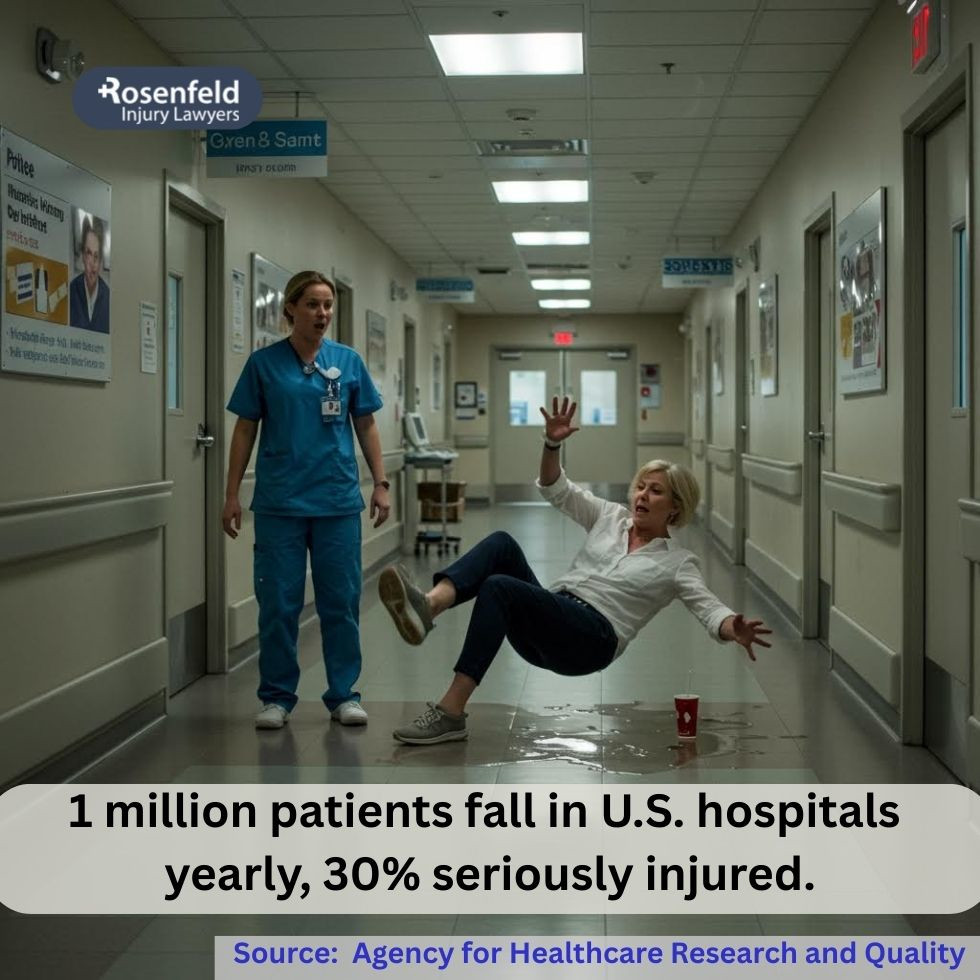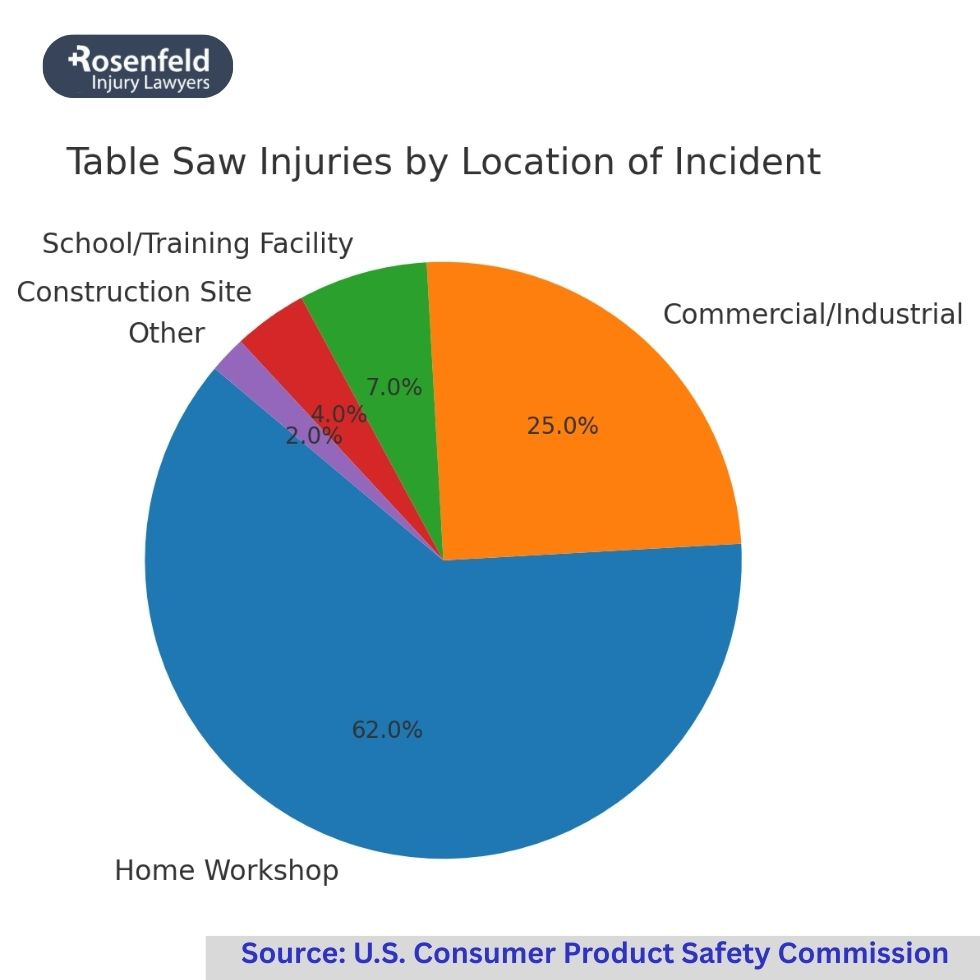Award-Winning Chicago Personal Injury Lawyer - Securing Justice
for Illinois Injury Victims - Over $450 Million Recovered
A fall in a hospital may seem minor, but hospital slip and fall cases often lead to serious injuries, mounting medical expenses, or even death. Even top Chicago facilities like Northwestern Memorial or UChicago Medicine can expose patients to dangerous conditions—wet floors, poor lighting, or inattentive medical staff.
If you were injured in a slip and fall in a hospital, you may be entitled to file a premises liability claim or other personal injury claims against the property owner or medical staff. At Rosenfeld Injury Lawyers, we help clients across Chicago seek compensation and hold negligent parties legally and financially accountable.
At Rosenfeld Injury Lawyers, we have more than $490 million for clients with serious injuries, including those hurt due to dangerous conditions in medical facilities. Recognized by Super Lawyers and the Million Dollar Advocates Forum, we’re widely regarded as one of Illinois’ leading personal injury firms. As a top-rated Chicago medical malpractice law firm, we provide the specialized legal oversight necessary to distinguish between simple premises accidents and professional negligence.
Our experienced slip and fall lawyers are committed to holding hospitals accountable and fighting for full compensation. From investigating unsafe premises to proving medical negligence, we focus on delivering strong legal representation and compassionate support to every client we serve.
Hospitals are high-traffic environments with patients in vulnerable physical states. Combine that with outdated infrastructure or rushed medical staff, and you have a setting where slip-and-fall accidents are common.
All of these are preventable known hazards. When ignored, they can violate the property owner’s duty to provide reasonably safe premises and lead to premises liability claims.

The injuries from a fall in a hospital can be far worse than one might expect, especially when the patient is elderly, recovering from surgery, or under sedation.
Victims often suffer:
These serious injuries can lead to long-term disability and emotional trauma. Victims may need repeated surgeries, extensive medical care, rehabilitation, or mobility devices. The costs often exceed what health insurance will cover, leaving victims burdened with massive medical bills and lost wages.
Yes. You can file a lawsuit if a fall occurred due to preventable negligence or unsafe property conditions. For hospital slips and falls, liability usually falls under one of two legal categories:
Under 735 ILCS 5/2-1701, hospitals and medical staff must provide a safe environment and proper assistance. If a nurse fails to respond to a call button or neglects to help a patient to the restroom, resulting in a fall, that may constitute medical negligence. Negligence often involves broader clinical failures; for instance, a Chicago Misdiagnosis Attorney or a Chicago Stroke Misdiagnosis Lawyer might find that a fall was actually triggered by a missed neurological event. Furthermore, our team includes a Chicago Surgical Error Lawyer for post-op falls and a Chicago Emergency Room Malpractice Attorney for patients injured due to chaotic ER triage.
When a property owner fails to repair a broken handrail, remove ice at an entrance, or mop up a spill, they can be held liable under 740 ILCS 130/2. Hospitals must fix known hazards and post adequate warning signs to prevent slip and fall accidents.
Not every fall results in a valid claim. That’s why it’s critical to have a knowledgeable slip and fall lawyer evaluate your case and determine liability.

You generally have two years from the date the accident occurred to file a claim under the Illinois statute of limitations (735 ILCS 5/13-202). However, certain cases involving government-run hospitals may require notice in a much shorter time.
Don’t wait. The sooner you contact a slip and fall lawyer, the more time your legal team will have to collect evidence, preserve medical records, and build a strong claim.
Hospitals and their insurers are often quick to deny responsibility when a slip and fall occurs. Many hospitals’ legal teams rely on common defenses to shift blame away from the facility. These may include arguing that the hazard was “open and obvious,” meaning the patient should have seen and avoided it. They may also claim comparative fault, suggesting the patient’s actions contributed to the fall. However, if a patient was dangerously disoriented due to pharmacy or sedation mistakes, our Chicago Medication Error Lawyer and Chicago Anesthesia Error Attorney can counter these defenses by proving that the medical provider failed to implement necessary fall-risk protocols.
Another tactic is claiming a lack of notice, stating that hospital staff didn’t know about the hazard in time to correct it. Some facilities argue that the defect was too minor to fix, referring to it as a “trivial” condition.
At Rosenfeld Injury Lawyers, we are well-versed in countering these strategies. We gather medical records, witness statements, and expert opinions to show that the hospital either knew or should have known about the dangerous condition and failed to maintain reasonably safe premises.
What you do after a hospital slip and fall can make or break your case. First, get medical treatment right away, even if injuries seem minor. Report the fall to hospital staff and request that the incident be formally documented. If your fall occurred while receiving intravenous fluids, a Chicago IV Infiltration Lawyer can evaluate if equipment mismanagement contributed to your loss of balance or physical distress.
If you can, take clear photos of the accident scene, especially any hazardous conditions or missing warning signs. Keep the shoes and clothing you had on during the fall, as they might help demonstrate that the hazard—not your footwear—caused the accident.
Gather contact information for any witnesses and save all medical bills and medical records related to your injuries. Avoid giving statements to hospital administrators or insurance companies without legal guidance. Speaking too soon can be used against you later.
Contact a law firm experienced in hospital slips and falls as quickly as possible. These steps can strengthen your claim and improve your chances of recovering full compensation for your injuries and financial losses.
If you were injured in a hospital slip and fall accident, you may be eligible to recover both economic and non-economic damages. Economic damages can include medical expenses, lost wages, reduced earning potential, and the cost of assistive devices. In fatal cases, families may also recover funeral and burial expenses.
Non-economic damages address the personal impact of fall injuries, such as physical pain, emotional suffering, and loss of enjoyment of life. In wrongful death claims, survivors may also receive compensation for loss of companionship. Our legal team fights to ensure your fall claim reflects the full scope of your losses.

If you or someone you love suffered fall injuries in a Chicago hospital, don’t face the legal process alone. At Rosenfeld Injury Lawyers, our law firm has a proven track record of helping clients recover compensation for injuries caused by negligence or unsafe property conditions.
We work on a contingency fee basis, and you pay nothing unless we win. Call us at (888) 424–5757 or fill out our contact form for a free consultation, and let our Chicago personal injury lawyers help you seek compensation and justice for the harm you’ve suffered.
Our downtown office, near the Richard J. Daley Center, Dirkson United States Courthouse, and the Chicago Workers’ Compensation Commission, offers convenient access from Aurora, Joliet, and Waukegan via I-90, I-94, and I-290.
225 W Wacker Dr #1660
Chicago, IL 60606
Phone: (847) 835-8895
Toll Free: (888) 424-5757
We also serve clients from Buffalo Grove, Elgin, Naperville, Rockford and throughout Illinois.
Resources: [1] Agency for Healthcare Research and Quality
All content undergoes thorough legal review by experienced attorneys, including Jonathan Rosenfeld. With 25 years of experience in personal injury law and over 100 years of combined legal expertise within our team, we ensure that every article is legally accurate, compliant, and reflects current legal standards.